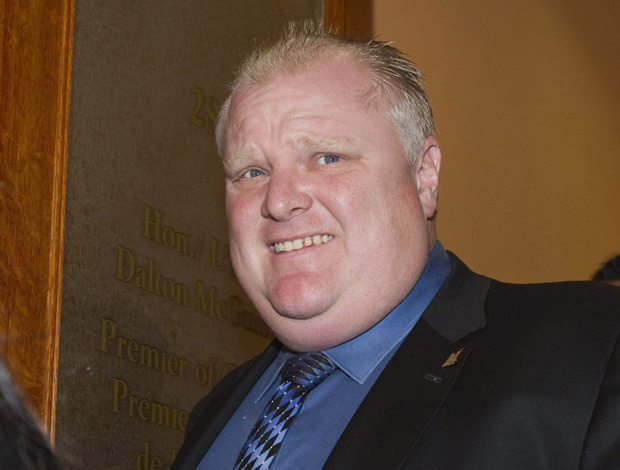TORONTO – The Supreme Court of Canada has ruled that it will not hear the appeal of a conflict of interest case that has followed Mayor Rob Ford for more than a year.

The Supreme Court did not give a reason for the ruling.
Global News has compiled a timeline of Ford’s conflict of interest troubles.
February 2010: Rob Ford, along with city staff, send out donation requests to official city lobbyists using official city letterhead.
The city’s integrity commissioner, Janet Leiper, finds that Ford’s actions violate city council’s code of conduct rules regarding the use of city staff and city resources.
August 2010: City council accepts the integrity commissioner’s findings and orders that Mayor Ford pay back $3,150 donated to his football foundation by official lobbyists.
February 2012: Despite Ford not having repaid the money as ordered by city council, councillors vote in favour of rescinding the previous motion and allow Ford to keep his money.
Ford votes in favour of the motion during February’s council session and does not declare a conflict of interest.
March 2012: Clayton Ruby, on behalf of Toronto resident Paul Magdar, files a conflict of interest lawsuit against Ford claiming he contravened the Municipal Conflict of Interest Act during the February city council session during which he voted in favour of a motion that benefitted him financially.
September 2012: The conflict of interest case against Ford begins in a Toronto courtroom.
Ruby questions Ford for roughly four hours during the court proceedings and Ford states that he did not think he was acting in conflict because of his understanding of conflict of interest rules.
While Ford admits on the stand to not having read the official rules regarding conflict of interest, he claims that both a councillor and the city must have a financial interest in a motion for there to be a conflict. Since the city did not have a financial interest in the matter, Ford says, there was no conflict of interest.

Get breaking National news
Ruby suggests during his questioning that Ford “chose to remain ignorant” of the rules during his time at city council.
November 26, 2012: Judge Charles Hackland rules that Ford is guilty of having violated the municipal conflict of interest rules and should be removed from office as a result.
Hackland claims Ford’s actions amount to “wilful blindness” of the rules.
Despite the ruling, Hackland puts a 14-day stay on Ford’s removal from office in order for the city to determine whether or not it will hold a byelection or nominate a current councillor to serve as mayor.
Hours after the judge’s decision, Ford said he plans to appeal the ruling.
November 28, 2012: Rob Ford officially files an appeal and request for a stay on the decision that would have him removed from office.
Ford’s application for a stay will be heard on December 5. If Ford’s application for a stay is denied, he will continue as mayor until December 10.
If the stay is accepted, which experts believe it will be, he may continue on as mayor until the conclusion of his appeal.
His appeal is scheduled to be heard in January.
November 30, 2012: Hackland agrees to a request by Ford’s lawyers to remove language in his decision that would prohibit the mayor from running in a mayoral byelection should he be removed from office.
December 05, 2012: An Ontario court judge grants Mayor Rob Ford his request for a stay of the order that he be removed from office.
The judge rules there is “no basis to conclude that any harm will be caused to the public interest” by granting a stay.
Magder, the man who took Ford to court over conflict of interest allegations, did not oppose Ford’s request for a stay.
January 23, 2013: Mayor Rob Ford will soon know whether or not the appeal of his ouster was successful as the Ontario Appeals Court is expected to release its decision Friday morning.
It was announced that the Ontario Appeals Court will release the decision on Ford’s appeal at 10:30a.m. on Friday.
January 25, 2013: Rob Ford wins his court battle to keep his job as mayor of Toronto. A Divisional Court panel strikes down a previous ruling that Ford should be dismissed from office for violating conflict of interest rules.
February 22, 2013: Alan Lenczner, the lawyer who represented Mayor Rob Ford, is seeking just over $116,000 from the Toronto man who sued Ford for an alleged conflict of interest.
Lenczner filed a submission with the Ontario Divisional Court seeking $107,070 in legal fees and $8,974 in other expenses and HST.
March 15, 2013: Clayton Ruby, the lawyer who represented Paul Magder in the court battle against the mayor, has asked the Supreme Court of Canada to review the case. Ruby says the case raises questions about the power of municipalities and their ability to hold public officials to account.
June 20, 2013: The Supreme Court of Canada rules that it will not hear an appeal.
The appeal, initiated by Clayton Ruby on behalf of Paul Magder, sought to restore the original ruling which found Ford had contravened the city’s municipal code of conduct.
A few hours after the ruling the mayor says he respected the decision of the Supreme Court and was relieved that issue is over.
“I’m so happy this is all over,” Ford says. “I’ve been vindicated and we can move on.”








Comments
Want to discuss? Please read our Commenting Policy first.